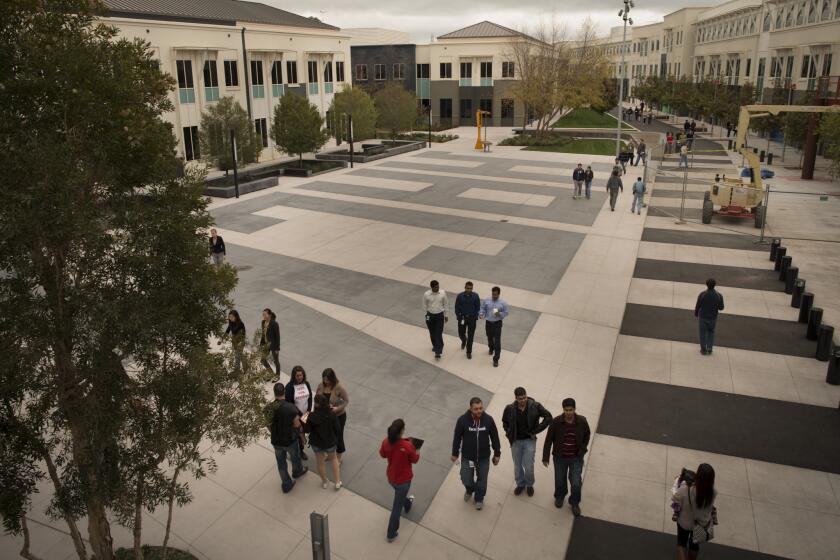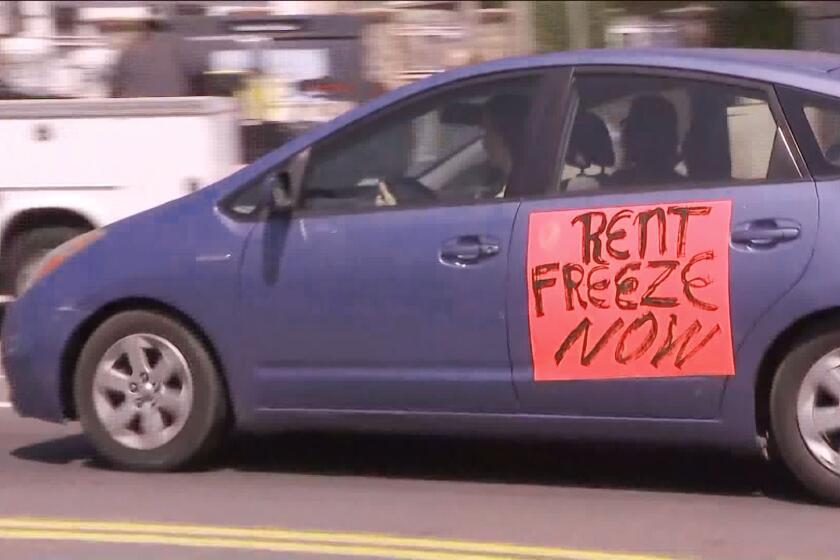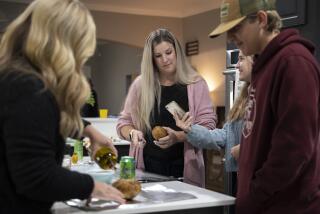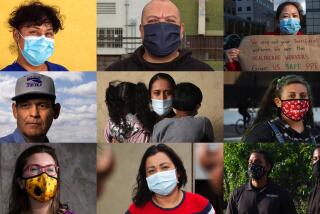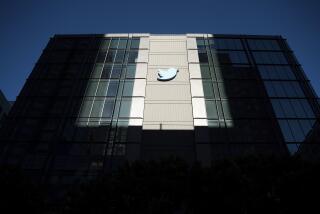Coronavirus and labor law: Know your rights, from paid sick leave to working from home
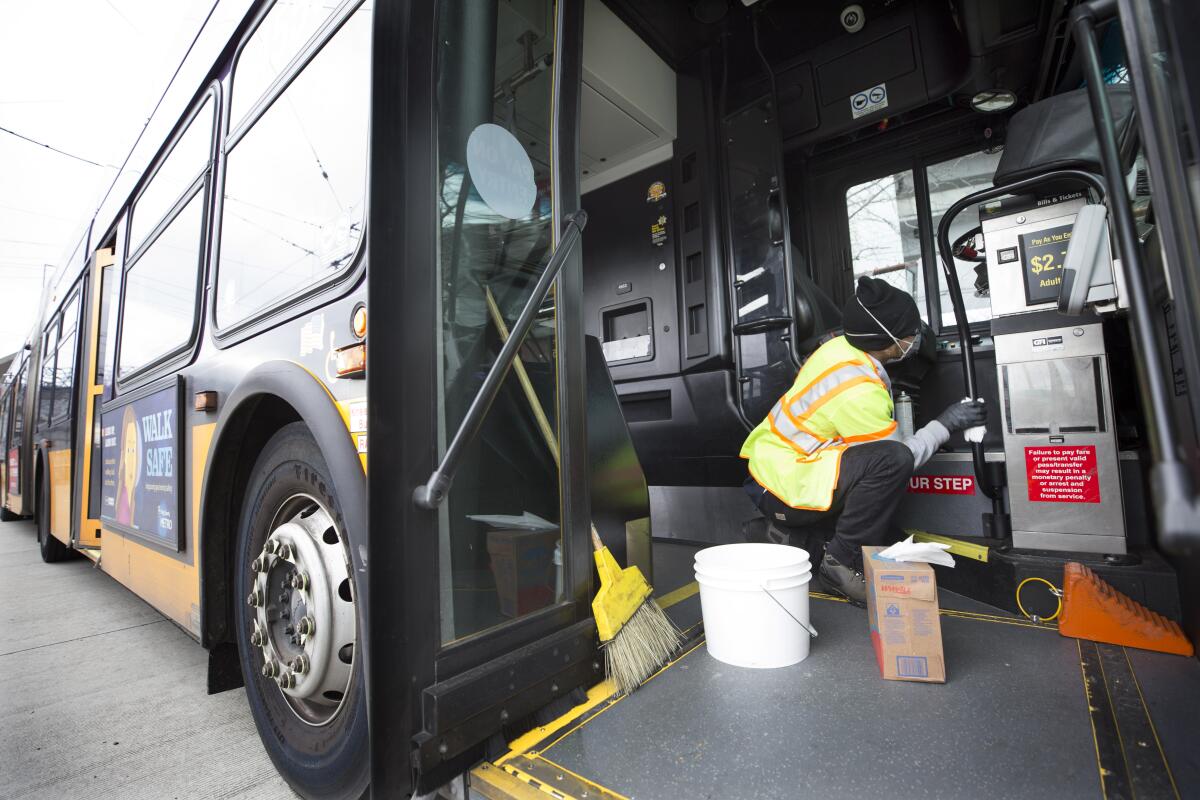
- Share via
As Lee Olesky heard the first reports of the novel coronavirus in Sacramento County, where she is employed as a social worker, she began to panic.
Olesky, 41, visits the homes of sick and elderly people on a daily basis, and worried she could carry the new illness to her clients. At the office, she doesn’t have an assigned seat but works at “floating” cubicles used by countless other field workers.
The anxiety built until, last week, she casually asked her supervisor whether she could work from home for the rest of the month as a precaution. Her supervisor was skeptical, and “kind of made a face,” but approved her request. Still, Olesky is required to venture out into the world for field visits daily as part of her job. She’s not alone.
The coronavirus outbreak has sparked drastic measures to prevent its spread across California, the United States and the world, and on Wednesday was declared a pandemic by the World Health Organization.
While some office workers may be able to self-quarantine entirely, many workers — typically low-wage blue-collar workers — will be asked to continue to show up to work as usual. Still others will lose work and wages as events are canceled and operations halted because of the viral outbreak. And a few will be asked to carry the weight of the heightened safety measures enacted to protect the many.
“You think, ‘That’s great, airlines are increasing the number of cleanings,’” for example, said Seema Patel, clinical director of the East Bay Community Law Center and a lecturer at Berkeley Law. “But who is doing that work? And do those workers have the same protections as the executives of airlines?”
A public health crisis is where paid sick time laws and unemployment insurance come into play as crucial safety nets, legal experts say.
Exactly how the outbreak affects you, the way you work, the precautions you are able to take or what benefits you might be able to access in the event you or a family member becomes sick — all that depends heavily on where you work and live and the generosity of your employer.
Here’s what labor lawyers, state officials and government agencies say could unfold in the workplace, and the rights workers have in California.
Do employees have the right to work from home?
There is no federal or California law that gives employees the right to work remotely, or the right to ask to work remotely. However, it probably won’t hurt to ask, especially given the unprecedented nature of the current public health landscape, experts say.
For workers in San Francisco, an ordinance called the Family Friendly Workplace Ordinance gives some employees the right to request flexible or predictable arrangements — including working from home — to assist with caregiving responsibilities. This ordinance does not grant this flexibility; it only provides a formal process for workers to request this type of accommodation.
If a worker is immunocompromised and the employer hasn’t already issued guidance to employees about working from home, it is possible the worker might be able to seek telecommuting accommodations per state and federal disability law, said UC Berkeley labor law professor Catherine Fisk.
What is the best way to ask to work from home?
Emphasize that working from home is not self-indulgence, but rather a public health measure.
“It’s not just about the employee afraid of getting sick; it’s the employee who’s afraid of being a vector for the illness,” whether it’s bringing an infection home to their family or from outside to their co-workers, Fisk said.
Employers should be thinking about the safety measures and benefits they can provide as they balance performing essential functions with protecting their workers from this infectious disease, Fisk said.
Many corporations in Silicon Valley and elsewhere are taking it upon themselves to help prevent spread of coronavirus by asking workers to perform their jobs remotely for the indefinite future.
Many companies have already begun to evolve their work-from-home policies as concern about preventing the spread of the coronavirus has bloomed.
Twitter became the first major U.S. corporation to strongly encourage its employees to work from home as a preventive measure on March 2. Google, Amazon and Microsoft, among others, have since followed suit.
“I think both employers and employees need to be negotiating thoughtfully about minimizing risk to everybody,” Fisk said.
What happens if I or a family member gets sick?
Your employer may provide paid sick days as part of your terms of employment. Many low-wage workers do not have access to paid sick days, as federal law did not require employers to provide them. That seems to be changing: President Trump signed an emergency coronavirus relief law March 18 that includes paid sick leave benefits for employees at small to midsize firms impacted by the virus.
Some part and full-time employees who have contracted COVID-19; who are in quarantine; who are caring for a family member affected by the virus; or caring for children whose schools have closed may be eligible for paid leave equivalent to two weeks of work per the new federal law.
Here’s who qualifies for paid sick leave, and who doesn’t, under the new federal emergency coronavirus relief package.
California already had a paid sick leave law. Employees in the state that meet certain requirements are entitled to at least three days of paid sick leave, and several California cities provide additional sick time.
If you are ill, or if you or a family member has been exposed to the coronavirus, you can take a sick day as a precaution. You don’t have to be diagnosed with the coronavirus in order to take a paid sick day.
Paying for sick employees to stay home helps reduce the spread of the seasonal flu, studies show. It could help reduce the rate of spread of the coronavirus, too.
Some companies have begun to adopt more flexible and generous sick leave policies in response to the coronavirus outbreak.
Walmart, the nation’s largest private employer, said Tuesday that on top of its existing paid sick leave policy, it would provide up to two weeks of paid leave for employees who fall ill or are quarantined because of a confirmed exposure to the coronavirus.
Darden Restaurants, the parent company of Olive Garden, previously did not provide its roughly 170,000 hourly employees with paid sick leave, except in the handful of states (including California) where it’s the law. Olive Garden said March 9 that it would permanently provide paid sick leave to all of its hourly employees.
Democrats in Congress, led by Rep. Rosa DeLauro (D-Conn.) and Sen. Patty Murray (D-Wash.), are trying to pass a sick leave bill, legislation that has been stalled for more than a decade. The legislation would make two weeks of sick leave accessible in the event of a public health crisis.
Which California cities have stronger paid sick day laws?
Los Angeles, Santa Monica, Berkeley, Emeryville, Oakland, San Diego and San Francisco all have local laws that mandate additional paid sick time.
I’m a gig worker. Am I entitled to benefits such as paid sick leave?
Assembly Bill 5, a state law that went into effect Jan. 1, aimed to make it harder to misclassify workers as contractors, which means a new swath of workers in California could be entitled to benefits such as three paid sick days and disability leave. Some of the biggest gig companies, such as Uber and Lyft, have continued to insist that their workers should be considered contractors under the law. That means some gig workers may not be able to access many of these benefits unless companies are forced to comply or workers’ classification status is fully hashed out in a legal battle.
Some Uber and Lyft drivers filed a complaint Wednesday in California, asking courts to issue immediate injunctions forcing the ride-hailing companies to classify them as employees in accordance with AB 5, as concern about the coronavirus grows.
U.S. Sen. Mark Warner (D-Va.) wrote a letter calling on Uber, Lyft, Postmates, Grubhub, DoorDash and Instacart to provide some type of financial safety net for drivers and couriers who become ill. Lyft said it would provide funds to drivers diagnosed with COVID-19 or placed under quarantine; Uber said drivers and couriers diagnosed or quarantined would receive compensation for up to 14 days.
On March 15, Gov. Gavin Newsom urged bars, nightclubs, wineries and breweries in California to shut down operations, and the same day, L.A. officials ordered bars to close and forced restaurants to halt dine-in service to slow the spread of coronavirus. Assemblywoman Lorena Gonzalez tweeted that hospitality workers impacted by the governor’s orders would likely be eligible for unemployment insurance even if they are classified as independent contracters and receive 1099 tax forms, because of AB5.
What if I run out of sick days?
If you have tested positive for the novel coronavirus or been exposed to it and are unable to work as a result, you may be able to file a Disability Insurance claim with the state of California.
This type of insurance offers short-term benefits to eligible workers who have lost wages because of an illness or injury unrelated to work or pregnancy. Payments dispensed from this insurance are dependent on income but are roughly 60% to 70% of wages and range from $50 to $1,300 per week.
If a family member falls ill you might be eligible to receive paid family leave from the state to take care of them.
For those not able to secure paid leave, state (California Family Rights Act) and federal laws (Family and Medical Leave Act) provide employees who meet certain specifications with up to 12 weeks of unpaid, job-protected leave per year.
What can I do if my workplace has shut down or my hours have been reduced?
If your hours have been reduced or your employer has shut down operations because of the coronavirus, you may be eligible for unemployment benefits that range from $40 to $450 per week. You can file a claim with California’s Employment Development Department.
Some California cities — aiming to protect low-wage workers on the brink of homelessness — have begun preparing temporary moratoriums on evictions for people whose wages have been affected by coronavirus-related work stoppages.
San Jose moved to install a moratorium of at least 30 days on evictions against residents who can demonstrate coronavirus-related loss of income. On March 13 San Francisco Mayor London Breed announced a temporary moratoriums on evictions. Los Angeles Mayor Eric Garcetti announced a similar order March 15. Oakland City Council said it would send a letter to Alameda County Superior Court asking the court to halt ongoing eviction cases and refrain from taking new cases.
With the coronavirus crisis forcing Californians lose paychecks, here’s a guide for renters and homeowners worried about paying their rent or mortgage.
Gov. Newsom announced March 12 that California would waive the one-week waiting period on unemployment or disability insurance claims for those affected by the coronavirus. “If a medical professional says you’re unable to work, if your hours have been reduced, or your employer has shut down -- you can file a claim,” he tweeted.
Where can I find more information or legal resources?
The California Labor and Workforce Development Agency has collected coronavirus-related resources for employers and workers on its website. It also offers a handy chart giving an overview of the cases in which employees might be able to file for disability insurance, paid family leave, etc.
Legal Aid at Work, which is based in San Francisco but serves workers statewide, provides free legal services and has posted a comprehensive list of frequently asked questions about the coronavirus and workplace issues.
Legal advocacy organization A Better Balance provides a list of California cities with sick-time laws and the details of those policies on its website.
More to Read
Inside the business of entertainment
The Wide Shot brings you news, analysis and insights on everything from streaming wars to production — and what it all means for the future.
You may occasionally receive promotional content from the Los Angeles Times.
